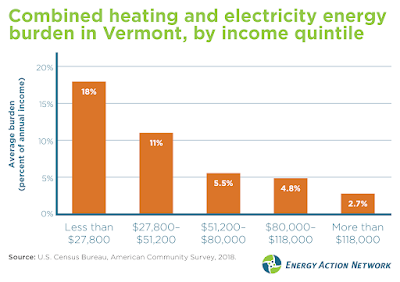It is very apparent by now that climate
change is happening both locally and globally with rising average temperatures
and devastating effects, including extraordinary wildfires, flooding, and other
extreme weather events. In September 2020, the Vermont Legislature enacted the
Global Warming Solutions Act (Act 153) that set greenhouse gas (GHG) reduction
targets and created a Climate Council to develop a Climate Action Plan (CAP) to
achieve those targets. The Climate Council published its report in December
2021, and in January the Legislature began working to implement it.
Transportation accounts for about 40% of
GHG emissions in Vermont and heating accounts for about 34%. Targeting these two energy-intensive sectors
will give us the best chance of meeting the target of a 40% reduction from 1990
levels of GHG emissions by 2030. The House Energy and Technology Committee has started
crafting legislation from some of the specific recommendations of the Climate
Action Plan regarding heating, including a Municipal Energy Resilience Plan
(bill H.518) and a Clean Heat Standard.
The Climate Council was careful to insist that whatever
Vermont’s cities, towns and villages own
and maintain approximately 7,000 old buildings that are expensive to heat and
have a large carbon footprint. To meet our climate goals and ease the energy
burden on municipal budgets, H.518 will support communities with technical
assistance, design support, and funding to make municipal assets more energy
efficient and to displace fossil fuels with cleaner options. It will expand the
State Energy Management Program to help municipalities finance improvements and
assist municipal leaders, who may lack the technical expertise to assess the
best investments to increase efficiency and resilience, with help from
Efficiency VT and regional planning commissions.
With one-third of Vermont’s climate
pollution coming primarily from fossil fuels used to heat our buildings and
water, dependence on fossil fuels is expensive with unpredictable price swings
for consumers. If you heat your home with oil or propane, you’re paying as much
as 40% above last year’s prices. This creates an especially large energy burden
for lower-income Vermonters. Unlike our highly regulated electric sector, which
is subject to the renewable energy standard (RES), fossil fuel corporations are
under no obligation to reduce the carbon pollution of their product. A Clean
Heat Standard (CHS) would require fossil fuel corporations to provide cleaner
heating fuel options and/or pay for pollution-reduction measures that benefit
Vermonters. These include employing cleaner heating options, like heat pumps,
heat pump water heaters, and advanced wood heat to displace fossil fuels, or
supporting weatherization and efficiency measures. A CHS places the obligation
of lowering emissions on fuel sellers while presenting Vermonters with choices
on how and when to move to cleaner heat. To ensure equity in the application of
the CHS we are considering various design options such as requiring a high
fraction of credits to come from serving low- and moderate- income homes,
providing extra credits for providing clean heat in rental housing, and making
incentive payments income-sensitive. Without implementing a CHS, Vermont will
not meet its emissions reduction requirements under the Global Warming
Solutions Act.
